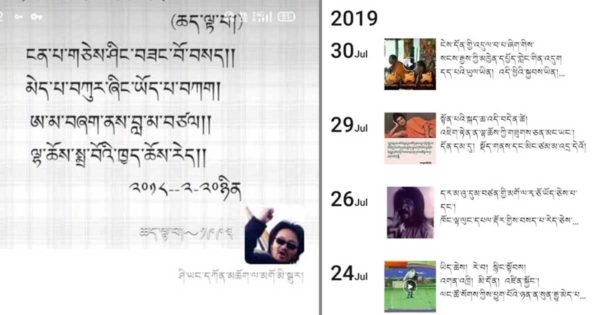A Chinese government response to an allegation letter by four UN experts and expert bodies regarding the cases of two detained Tibetans, Rinchen Tsultrim and Go Sherab Gyatso, confirms the concerns of rights groups, the International Campaign for Tibet said today.
Rinchen Tsultrim was detained, charged and, in November 2020, sentenced to four years and six months’ imprisonment for “inciting secession.” Chinese authorities claim that he had posted messages on the Chinese social media app WeChat that “endangered national unity, sovereignty and territorial integrity and undermined social stability.”
However, the Chinese government’s response to the UN experts failed to substantiate which aspects of his posts violated Chinese law. The exact content of his posts as seen and made public by ICT shows a legitimate expression of opinions and thoughts, which is lawful per international law.
Rinchen Tsultrim

Screenshot of Rinchen’s last post on WeChat dated July 30, 2019; a day before his arrest.
The response from the Chinese government claimed that Rinchen Tsultrim’s procedural rights were guaranteed but failed to substantiate the claim. On the contrary, ICT recognizes that Rinchen’s trial was not public, and he lacked access to a defense lawyer of his choice.
Besides the violation of Rinchen’s procedural rights, no family member has been able to visit him since his arrest more than two years ago in August 2019. Denial of visit is a violation of the rights of a detainee according to international law. While ICT welcomes the fact that the Chinese government acknowledged its imprisonment of Rinchen in Aba Prison, ICT urges the government to fulfill its obligation to allow family members to visit Rinchen in the prison at the earliest.
Chinese authorities habitually use charges of “state security” violations, “secession” or “separatism” as a pretext to persecute expressions of support for exiled Tibetan leader the Dalai Lama or Tibetan culture, or for voicing independent thought and dissent. International law protects such peaceful expression, even if it were done to call for the separation of Tibet from China. It is notable that there is no real indication that Rinchen voiced such calls explicitly on WeChat.
“The response by the Chinese government underscores the fact that Rinchen Tsultrim has been arbitrarily detained for peacefully expressing his opinion and thought. He must therefore be released immediately,” ICT Head of UN Advocacy Kai Mueller stated. “His case stands for the many Tibetans who are being persecuted for expressing discontent with government policies, for their community activism or for expressing religious beliefs and practicing their culture autonomously. We call on the international community, governments and UN stakeholders to urge the Chinese government to release Rinchen Tsultrim and to fully protect the right to freedom of expression and opinion and of religion or belief.”
Go Sherab Gyatso
The case of Go Sherab Gyatso also resembles Rinchen Tsultrim’s case. Go Sherab Gyatso was also placed under criminal detention on suspicion of “inciting secession.” The government response reveals that a formal prosecution was launched on Feb. 3, 2021—over three months after his initial detention.
The Lhasa City Intermediate People’s Court has held a hearing on his case, but no verdict has been issued. The People’s Republic of China mission claims that Go Sherab Gyatso’s family has been “promptly notified of the relevant information”; however it is evident that information is still being withheld. It is notable that the response does not detail the evidence being used against Go Sherab Gyatso, his access to a lawyer or relatives, and most importantly, his current location.
ICT calls on the Chinese government to reveal the whereabouts of Go Sherab Gyatso, and, if the allegations against him cannot be substantiated and he is merely detained for peacefully expressing his opinions and thought, he must be released immediately. ICT is also concerned about the threat of torture and ill-treatment of Go Sherab Gyatso.

